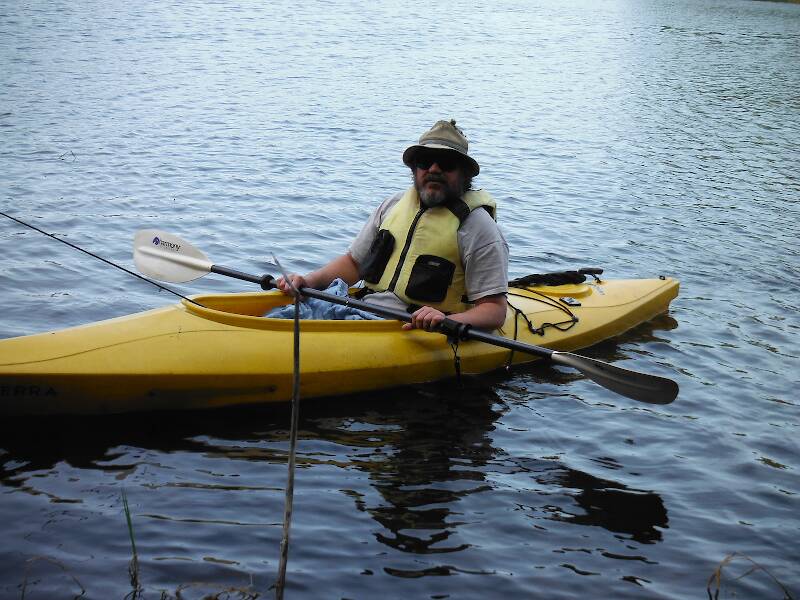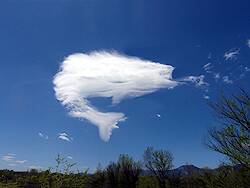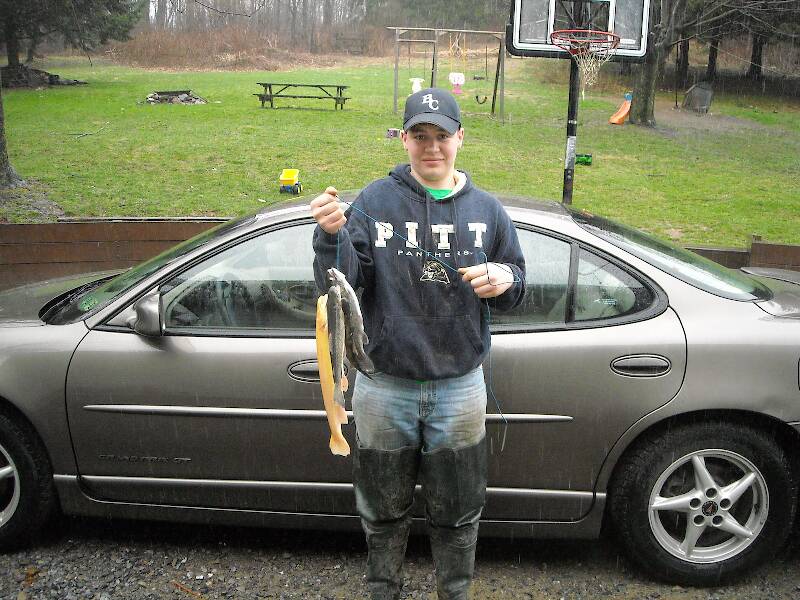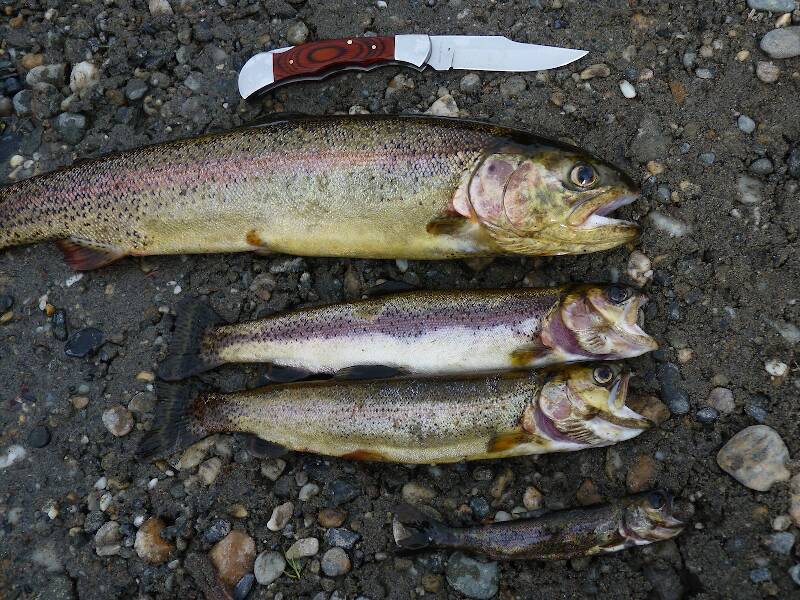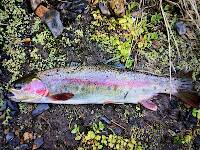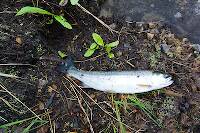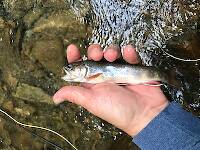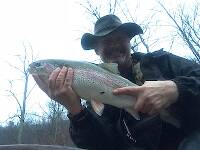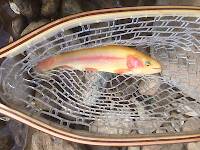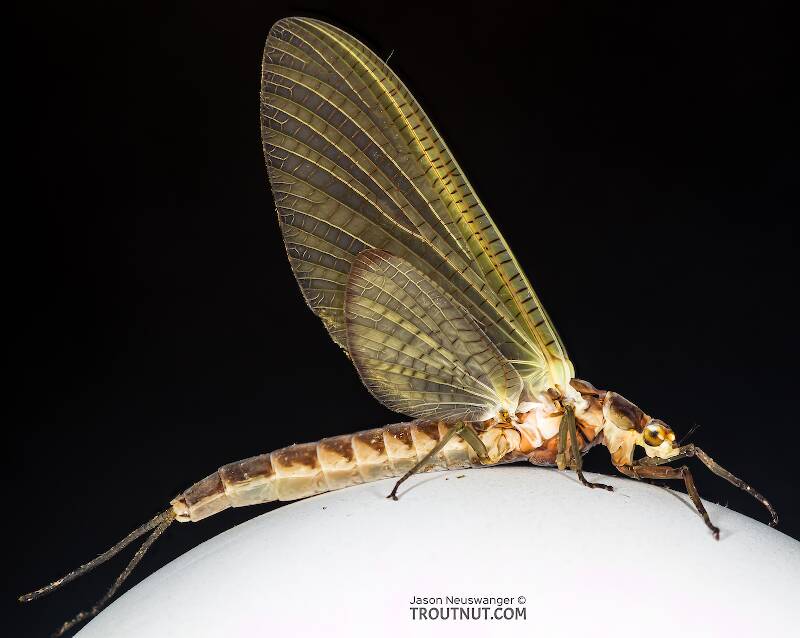
Hex Mayflies
Hexagenia limbata
The famous nocturnal Hex hatch of the Midwest (and a few other lucky locations) stirs to the surface mythically large brown trout that only touch streamers for the rest of the year.
Featured on the forum
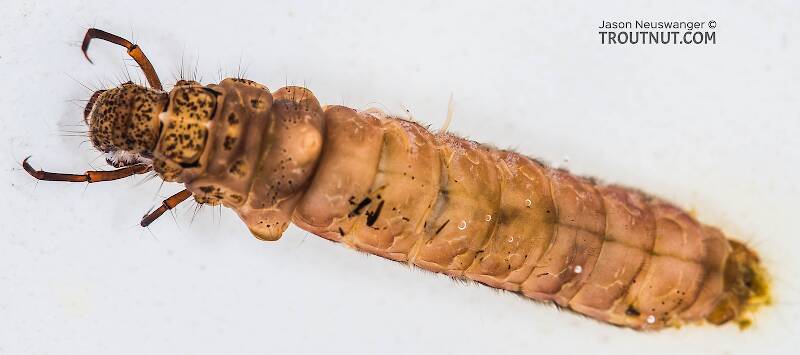
This specimen appears to be of the same species as this one collected in the same spot two months earlier. The identification of both is tentative. This one suffered some physical damage before being photographed, too, so the colors aren't totally natural. I was mostly photographing it to test out some new camera setting idea, which worked really well for a couple of closeups.

Troutnut is a project started in 2003 by salmonid ecologist Jason "Troutnut" Neuswanger to help anglers and
fly tyers unabashedly embrace the entomological side of the sport. Learn more about Troutnut or
support the project for an enhanced experience here.
Chris_3g
Posts: 59
Posts: 59
Chris_3g on Aug 21, 2007August 21st, 2007, 5:03 am EDT
Some of the streams I fish are tributaries to our lakes which often receive runs of rainbows and / or brown trout. These same tributaries, however, also receive stocked trout via the NY DEC, and these are the fish that I assume I am targeting when I fish them. I practice catch-and-release fishing, and as of late, I have been very mindful to de-barb my hooks.
That being said, I recently had the misfortune of hooking a particularly small rainbow (still with parr marks) around the eye. Anyway, I did what I could, but it was clear that I had messed this little rainbow up pretty badly. I released the fish, and aside from an intense feeling of guilt that has lasted for a couple of days, a lingering question has remained as to whether or not I should have released the fish or killed it, in order to be more humane. Do any of you have an opinion or a similar experience?
A further question that I wanted to ask is whether or not it is ethical to fish particularly inviting holes in streams where you know that juvenile trout exist, but where you expect larger fish should be holding. I really enjoy fly-fishing, but I am not particularly fond of maiming the trout in the process, especially wild juveniles. I understand that if a wild population exists, there will likely be juveniles present, but there is no way to inform the juveniles to stay home while I fish for their big brothers / sisters.
I have fished these tributaries, off and on, most of the season with the idea in my head that the stocked fish will have spread out and moved into the various holes throughout the stream. Out of all of these outings, however, I've only caught two or three trout that I considered to be reasonably sized, and these were mature wild trout. It's not that I don't like catching wild trout - I just don't want to harm the juveniles in the process, because a wild, reproducing population is a very good thing!
Thoughts, or am I over-thinking things to start with?
Chris.
That being said, I recently had the misfortune of hooking a particularly small rainbow (still with parr marks) around the eye. Anyway, I did what I could, but it was clear that I had messed this little rainbow up pretty badly. I released the fish, and aside from an intense feeling of guilt that has lasted for a couple of days, a lingering question has remained as to whether or not I should have released the fish or killed it, in order to be more humane. Do any of you have an opinion or a similar experience?
A further question that I wanted to ask is whether or not it is ethical to fish particularly inviting holes in streams where you know that juvenile trout exist, but where you expect larger fish should be holding. I really enjoy fly-fishing, but I am not particularly fond of maiming the trout in the process, especially wild juveniles. I understand that if a wild population exists, there will likely be juveniles present, but there is no way to inform the juveniles to stay home while I fish for their big brothers / sisters.
I have fished these tributaries, off and on, most of the season with the idea in my head that the stocked fish will have spread out and moved into the various holes throughout the stream. Out of all of these outings, however, I've only caught two or three trout that I considered to be reasonably sized, and these were mature wild trout. It's not that I don't like catching wild trout - I just don't want to harm the juveniles in the process, because a wild, reproducing population is a very good thing!
Thoughts, or am I over-thinking things to start with?
Chris.
Softhackle on Aug 21, 2007August 21st, 2007, 5:54 am EDT
Chris,
Don't beat yourself up about this. Trout are survivors, and that trout will probably do fine. Remember that trout use other senses, other than their eyes to detect food. Their lateral line is one such way they do so.
I once read of a trout that was blind on one side, but that was surviving well. The fisherman that caught and released it knew this because when the fly was cast slightly beyond the fish, it would not take the fly. The trout did take the fly that was fished to it on the close side. Other than the injured eye, the trout was perfectly healthy, and went back to the water to continue its life.
There is no way, as far as I know, to fish for trout where you are not going to catch some immature trout, and this is especially true if natural breeding is taking place. Trout face a number of problems as they grow, especially predation--even by larger trout. Many do not make it, but a certain number do--thank God.
If you can locate a copy, I'd suggest a video called "The Way Of A Trout". It's an oldie but goodie and was issued by Trout Unlimited which originally released it as a film to show to chapters, etc.
My best,
Mark
Don't beat yourself up about this. Trout are survivors, and that trout will probably do fine. Remember that trout use other senses, other than their eyes to detect food. Their lateral line is one such way they do so.
I once read of a trout that was blind on one side, but that was surviving well. The fisherman that caught and released it knew this because when the fly was cast slightly beyond the fish, it would not take the fly. The trout did take the fly that was fished to it on the close side. Other than the injured eye, the trout was perfectly healthy, and went back to the water to continue its life.
There is no way, as far as I know, to fish for trout where you are not going to catch some immature trout, and this is especially true if natural breeding is taking place. Trout face a number of problems as they grow, especially predation--even by larger trout. Many do not make it, but a certain number do--thank God.
If you can locate a copy, I'd suggest a video called "The Way Of A Trout". It's an oldie but goodie and was issued by Trout Unlimited which originally released it as a film to show to chapters, etc.
My best,
Mark
"I have the highest respect for the skilled wet-fly fisherman, as he has mastered an art of very great difficulty." Edward R. Hewitt
Flymphs, Soft-hackles and Spiders: http://www.troutnut.com/libstudio/FS&S/index.html
Flymphs, Soft-hackles and Spiders: http://www.troutnut.com/libstudio/FS&S/index.html
Davez on Aug 21, 2007August 21st, 2007, 5:57 am EDT
you felt guilt for a few days? yikes, i think i might consider quitting fishing.
kidding.
yeah its cruel, there will be casualties, however you are making right by fishing debarbed hooks, heavier tippets and not playing them to death.
fish bigger flies in those holes. the big fish will eat them, the little guys might hit them, but not hook themselves.
good luck.
kidding.
yeah its cruel, there will be casualties, however you are making right by fishing debarbed hooks, heavier tippets and not playing them to death.
fish bigger flies in those holes. the big fish will eat them, the little guys might hit them, but not hook themselves.
good luck.
Jmd123 on Aug 21, 2007August 21st, 2007, 6:21 am EDT
Chris, Dave, and Mark:
I MYSELF once caught a rainbow trout already missing it's right eye. Before I found this out, two things about this fish befuddled me - first, I could SEE IT crystal clear, but it didn't seem to care that I was there; and second, it only reacted to insects floating by on it's left side. It took me an hour and a half and several fly changes before it finally struck hard enough to get itself hooked. When I brought it to hand, I discovered why it ignored everything on its right side. While holding it, I thought about taking it home to eat - I was much more into eating my catch back then than I am now - and as I contemplated this it promptly jumped out of my hand and back into the river. So I though, it has survived THIS long with only one eye, so why not let it go? It seemed to be healthy otherwise, nicely colored and no other injuries. I have told this story before, so I'm now wondering if it somehow ended up being the story that you heard! There's an awful lot of similarities, that's for sure. Then again, I can't imagine that this is a unique experience...
I once accidentally killed a juvenile largemouth in Missouri while fly fishing a local stream, and it died right in front of me and sank to the bottom in plain sight. Made me feel like SH*T!! It didn't stop me from fly fishing though, not that day or ever since. There will always be the occasional casaulty, so long as it's not happening to EVERY fish you catch. Besides, the crayfish have to make a lving, too..
Jonathon
I MYSELF once caught a rainbow trout already missing it's right eye. Before I found this out, two things about this fish befuddled me - first, I could SEE IT crystal clear, but it didn't seem to care that I was there; and second, it only reacted to insects floating by on it's left side. It took me an hour and a half and several fly changes before it finally struck hard enough to get itself hooked. When I brought it to hand, I discovered why it ignored everything on its right side. While holding it, I thought about taking it home to eat - I was much more into eating my catch back then than I am now - and as I contemplated this it promptly jumped out of my hand and back into the river. So I though, it has survived THIS long with only one eye, so why not let it go? It seemed to be healthy otherwise, nicely colored and no other injuries. I have told this story before, so I'm now wondering if it somehow ended up being the story that you heard! There's an awful lot of similarities, that's for sure. Then again, I can't imagine that this is a unique experience...
I once accidentally killed a juvenile largemouth in Missouri while fly fishing a local stream, and it died right in front of me and sank to the bottom in plain sight. Made me feel like SH*T!! It didn't stop me from fly fishing though, not that day or ever since. There will always be the occasional casaulty, so long as it's not happening to EVERY fish you catch. Besides, the crayfish have to make a lving, too..
Jonathon
No matter how big the one you just caught is, there's always a bigger one out there somewhere...
Minnesota on Apr 26, 2012April 26th, 2012, 12:51 am EDT
"the way of a trout" is a great video, i have it on vhs. My 5th grade math teacher lend it to me, and I made a copy. But when i dubbed it, I had the audio on my local radio station on my channel 3. And the crazy thing is, the music lines up really awesome. If a fish don't make it, it will be food for birds, eagles, and plenty of other species. It will not get wasted.
Jason Moe
PaulRoberts on Apr 27, 2012April 27th, 2012, 6:39 am EDT
Sounds like FL tribs. Most of those tribs produce wild fish, and are supplemented. Small rainbows esp have large eyes set well forward, so they are at most risk. There are a couple things you can do:
-Reduce hook gap. To protect little 5inch parr, go #12 or smaller. For 8" go #8 or smaller. Go #4 or smaller to protect 12"ers.
-Avoid the shallower holds that normally (no always) are dominated by small 'bows. Also, small bows can use faster shallower currents than larger bows and simply faster current than browns. Avoid those fast shallow riffs, esp at the pol heads. Bc of the speed diff between fish, I've often offered that, if you are only catching little bows, you are fishing too fast.
In some FL tribs (Catherines and Cayuga Inlet esp) there can be so many small bows that they are hard to avoid. There is better fishing elsewhere though, so if you have the option, try others trout waters.
As to ethics, that's your decision. Ethics is monitored within, (and influenced from without -your reason for asking I suppose). Few of those eye damaged fish survive I assume since I so rarely see one-eyed fish, esp in trout, although I may see lots of jaw damaged trout. I doubt your fishing, with an occasional eye piercing is going to impact the fishery.
-Reduce hook gap. To protect little 5inch parr, go #12 or smaller. For 8" go #8 or smaller. Go #4 or smaller to protect 12"ers.
-Avoid the shallower holds that normally (no always) are dominated by small 'bows. Also, small bows can use faster shallower currents than larger bows and simply faster current than browns. Avoid those fast shallow riffs, esp at the pol heads. Bc of the speed diff between fish, I've often offered that, if you are only catching little bows, you are fishing too fast.
In some FL tribs (Catherines and Cayuga Inlet esp) there can be so many small bows that they are hard to avoid. There is better fishing elsewhere though, so if you have the option, try others trout waters.
As to ethics, that's your decision. Ethics is monitored within, (and influenced from without -your reason for asking I suppose). Few of those eye damaged fish survive I assume since I so rarely see one-eyed fish, esp in trout, although I may see lots of jaw damaged trout. I doubt your fishing, with an occasional eye piercing is going to impact the fishery.
Vinlflyfish on Apr 27, 2012April 27th, 2012, 5:09 pm EDT
I also have caught a fish missing an eye it was an 18 inch rainbow the eye was completely healed over and was perfectly healthy
trout; a mans best friend
Troutnut on Apr 28, 2012April 28th, 2012, 9:29 am EDT
I released the fish, and aside from an intense feeling of guilt that has lasted for a couple of days, a lingering question has remained as to whether or not I should have released the fish or killed it, in order to be more humane.
If it was too small to legally keep, then it should definitely have been released. Even if you could have kept it, releasing it is still okay. Some fish survive with one eye. Most small trout don't survive to become big trout, anyway. Worrying about "humane" deaths for fish in the wild is rather pointless. The fate of most of them is to be chewed up alive or slowly suffocated to death in the digestive juices of a larger fish or bird.
You should certainly make a fair effort to minimize suffering, but don't feel at all guilty when the results aren't perfect.
A further question that I wanted to ask is whether or not it is ethical to fish particularly inviting holes in streams where you know that juvenile trout exist, but where you expect larger fish should be holding.
I think the "fair effort" to minimize suffering involves things like de-barbing your hooks and not keeping fish out of the water too long if you plan to release them. It does not involve curtailing your angling opportunities.
I understand that if a wild population exists, there will likely be juveniles present, but there is no way to inform the juveniles to stay home while I fish for their big brothers / sisters.
There are also many more juveniles in a system than will ever make it to adulthood. They have to run a gauntlet of herons, bigger trout, pike, bass, or other predators that make you and your barbless fly look like a walk in the park. If you maim one, take comfort in the fact that it probably wasn't going to make it anyway. This isn't an invitation for people to deliberately maim large number of small trout, of course, but a reason to not feel guilty when it happens by accident.
Jason Neuswanger, Ph.D.
Troutnut and salmonid ecologist
Troutnut and salmonid ecologist
GldstrmSam on Apr 30, 2012April 30th, 2012, 2:03 pm EDT
Small rainbows esp have large eyes set well forward, so they are at most risk.
I know definitely how that is. In one lake I fish up here, I mostly caught small rainbows and an occurrence that happened all to often was that the hook would go up through the roof of the mouth and damage the eye. That was when I still used worms. Now I started using flies the damage done has been cut down amazingly.
Due to the damage done I now would only use worms if I was fishing to eat.
There is no greater fan of fly fishing than the worm. ~Patrick F. McManus
Quick Reply
Related Discussions
Topic
Replies
Last Reply
3
Mar 18, 2009
by Andrew
by Andrew



